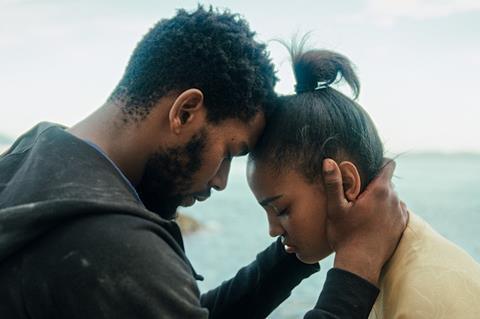Jean-Bernard Marlin’s fiery gang-war film confirms the promise of his debut ’Shéhérezade’

Dir. Jean-Bernard Marlin. 2023. France. 120 mins.
French writer-director Jean-Bernard Marlin won the Jean Vigo Award and the César for Best First Film with his 2018 debut Shéhérezade, and now looks set for further glory with follow-up Salem, an uneven but furiously ambitious variation on the perennial gang war drama. Set again in Marseille and cast with young non-professionals, Salem has something of the fired-up urban realism of Ladj Ly’s Les Misérables, but with a dream-like, even apocalyptic dimension that makes for an eccentric but absolutely individual proposition. Young audiences especially should take to a film that mixes familiar genre action with romance and a wild-eyed visionary streak.
An eccentric but absolutely individual proposition
Where Shéhérézade depicted a young North African underworld, the two communities here are African – from the Comoros islands – and Gypsy. Told in three chapters, the film begins as a sort of ’Romeo And Juliet’ story about a young couple, 14-year-old Comoran boy Djibril (Dalil Abdourahim) and Gypsy girl Camilla (Maryssa Bakoum), from neighbouring Marseille estates, Grasshopper and Cricket respectively. The estates each have their own ruling criminal gang, and when Camilla becomes pregnant, Djibril initially wants her to have an abortion: a love story between members of rival clans is trouble enough, but having a baby would really set things on fire. Then Grasshopper gang boss Black Cat (Amal Issihaka Hali), father figure to Djibril, leans on the boy to bring him his classmate Mahad. The latter is murdered in front of Djibril, and in his dying moments, puts a curse on the hood. His pet cicada seems to signify that it might already be working.
The film’s second chapter focuses on Djibril, now 26 and played by Oumar Moindjie; after 12 years in prison and in mental care, he believes he has healing powers and is convinced that his and Camilla’s baby girl Ali (now played as an adolescent by Wallenn El Gharbaoui) will be the world’s saviour. Released from prison, he tries to make contact with his daughter, only to be brusquely rejected; but, as swarms of cicadas hover over Marseille and Black Cat’s dominion continues, things get weird, even metaphysical.
Essentially a mean-streets redemption drama, Salem - meaning ‘peace’ - has something of a flavour of Jacques Audiard’s A Prophet both in its harsh underworld realism and in its hallucinatory touches; cockfighting scenes also bring a bloody hint of Amores Perros. Where Salem really asks viewers to take a leap of faith is in its supernatural/religious dimension, with VFX throughout, and especially in the full-out delirious third chapter, introducing a Plagues-of-Egypt element into a narrative that fuses Muslim and Christian theologies to fascinating effect (factor in some Greek mythology too, if you read the cicadas as avenging Furies).
Key to making it work, along with the impressive VFX work, is the cinematography of Jonathan Ricquebourg (also currently winning Cannes plaudits with the altogether different The Pot-au-Feu). After bringing an intense colour palette to Shéhérezade, he goes for a more muted approach here, but brings a scale of different intensities to harshly-textured but often intensely luminous widescreen imagery, bringing a heightened romanticism to mundane or brutally unglamorous banlieue settings.
The action sequences are generic but compelling, with occasional flourishes of quasi-surrealism – as in the sudden appearance of a pack of running dogs in a chase sequence. Marlin works with a terrific set of young actors at the heart of a sprawling cast, notably Soumare as the younger, fiery Camilla, El Gharbaoui as the young, spiky but wounded Ali, and Mohamed Soumare as the teenage Djibril’s pint-size homeboy Shakur, later played by Rachid Ousseni. As Djibril young and old, Abdourahim and Moindjie are uncannily matched, in a feat by the casting department; they respectively bring a vulnerable diffidence and an introspective solemnity that makes Djibril entirely convincing as a lost sheep turned madman-saint.
Despite its relatively brief running time, however, the film feels a little over-extended, with some distinct slack patches, while the cursory treatment of a strand involving a corrupt local politician suggests that Salem as it stands may have undergone some last-minute pruning. Still, despite these and an arguable tendency to self-indulgence, Salem has ferocity and ambition that deserve to get attention for the film and its very talented director.
Production companies: Unité, Vatos Locos
International sales: Goodfellas, feripret@goodfellas.film
Producers: Bruno Nahon, Thomas Morvan, Jean-Bernard Marlin, Marine Bergère, Romain Daubeach
Screenplay: Jean-Bernard Marlin
Production Design: Laurie Colson
Main cast: Dalil Abdourahim, Oumar Moindjie, Wallenn El Gharbaoui, Mohamed Soumare, Rachid Ousseni







![The Brightest SunScreen[Courtesy HKIFF]](https://d1nslcd7m2225b.cloudfront.net/Pictures/274x183/3/5/0/1448350_thebrightestsunscreencourtesyhkiff_312678.jpg)














![The Brightest SunScreen[Courtesy HKIFF]](https://d1nslcd7m2225b.cloudfront.net/Pictures/100x67/3/5/0/1448350_thebrightestsunscreencourtesyhkiff_312678.jpg)


No comments yet